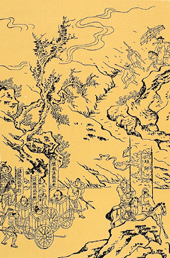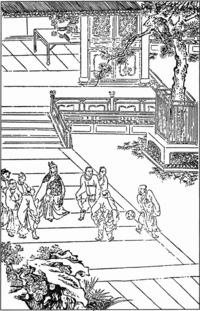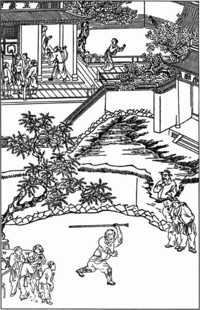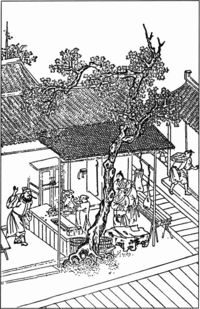Water Margin
Water Margin or Outlaws of the Marsh (Traditional Chinese: 水滸傳; Simplified Chinese: 水浒传; pinyin: Shuǐhǔ Zhuàn) is one of the Four Great Classical Novels of Chinese literature. Attributed to Shi Naian( 施耐庵), whom some believe to be Luo Guanzhong (羅貫中), the novel details the trials and tribulations of 108 outlaws during the mid Song Dynasty( 宋朝). The story is generally based upon the historical bandit Song Jiang (宋江) and his 36 companions, who were active in the Huai River region and eventually surrendered to government troops in 1119. “Water Margin,” however, is set on Mount Liang, (梁山, Liáng Shān), a mountain in southern Shandong province which is surrounded by the largest marshland in north China. Because the area was largely a wasteland on the frontiers of several administrative units, government control was minimal, and bandit chiefs were active there during the Northern Song. Legends about some of the bandits on Mount Liangshan, who preyed selectively upon the rich and became known as "righteous bandits" (yi fei, 義匪), probably provided the basis for the Water Margin. Stories about the bandits of Mount Liang became popular as subjects for Yuan Dynasty (元朝) drama. During this time, the material on which the Water Margin was based evolved into what it is today. Some scholars theorize that the Water Margin story became popular during the Yuan Dynasty because of resentment toward the Mongol rulers; Song Jiang's rebellion, which was seemingly directed against the Song Dynasty, was also interpreted as a call to oppose all corrupt governments
The story tells about the exploits of a group of 105 men and 3 women, representing all classes of Chinese society, who rose up, under the leadership of Song Jiang, against the tyranny of a corrupt and unjust official in the Song dynasty. Eventually, after defeating the Imperial forces sent to suppress them, they were granted amnesty and invited to form their own company in the Imperial army. They were then sent to attack Fang La in the south, who had declared himself an emperor, and met a tragic end.
Historical Context and Development
Water Margin is generally based upon the historical bandit Song Jiang (宋江) and his 36 companions. The group was active in the Huai River region and eventually surrendered to government troops in 1119. They are recorded in the Song Shi (宋史, 宋史, "History of the Song Dynasty) (1345), the name of Song Jiang appearing in the chapter on Emperor Huizhong, and the activities of the gang in the chapter on Zhang Shuye (張叔夜|張叔夜). Folk stories about Song Jiang circulated during the Southern Song. The first text to name each of Song Jiang's 36 companions was the thirteenth century Guixin Zashi (癸辛雜識, "Miscellaneous Observations from the Year Guixin") by Zhou Mi (周密, 周密) (1232-1298). Among the 36 are Lu Junyi, Guan Sheng, Ruan Xiaoer, Ruan Xiaowu, Ruan Xiaoqi, Liu Tang, Hua Rong, and Wu Yong. Some of the characters who later become associated with Song Jiang also appeared around this time. They include Sun Li, Yang Zhi, Lin Chong, Lu Zhishen, and Wu Song.
A direct precursor of Water Margin was the Da Song Xuanhe Yishi (大宋宣和遺事, "Old incidents in Xuanhe period of the great Song Dynasty"), which appeared around the mid-thirteenth century. The text was basically a written version of storytellers' tales, based loosely on historical events. It was divided into ten chapters, roughly covering the history of the Song Dynasty from the early eleventh century to the establishment of the Southern Song regime in 1127. The fourth chapter covered the adventures of Song Jiang and his 36 companions, and their eventual defeat by Zhang Shuye (張叔夜). Some of the more well-known episodes and characters of the Water Margin are clearly evident, including "Yang Zhi selling his sword," "Stealing the birthday present," "Song Jiang kills his slave girl," "Fighting Fang La" (方腊, a rebel in the Song Dynasty). The story placed Song Jiang and his bandits in the Taihang Mountains, and the members of his band represented an assortment of social classes and professions, including fishermen, ex-imperial drill instructors, and inn-keepers.
Stories about the bandits of Mount Liang became popular as subjects for Yuan Dynasty (元朝) drama. During this time, the material on which the Water Margin was based evolved into what it is today. Song Jiang's band was expanded to number one-hundred-and-eight, and though they came from different backgrounds, all eventually came to live on Mount Liang, (梁山, Liáng Shān), a mountain in southern Shandong province. The area was surrounded from prehistoric times by the largest marshland in north China, called the "Daye Marsh" and later the "Liangshan Marsh." During the Song Dynasty, the Yellow River passed through the area. Mount Liang was located at the extreme north of what became known as the "eight hundred li moorage of Mount Liang." Because the area was largely a wasteland on the frontiers of several administrative units, government control was minimal. It is known that bandit chiefs were active in the area during the Northern Song, although Song Jiang, one of the chief protagonists of Water Margin, was not associated with the area. Some of the bandits on Mount Liangshan preyed selectively upon the rich and became known as "righteous bandits" (yi fei, 義匪). Legends about the heroes of Mount Liangshan, which provided the basis for Water Margin, probably formed from this historical context. Banditry continued on Mount Liang until the mid-seventeenth century, when the Qing Dynasty government established a military garrison at what is now the city of Liangshan.
Some scholars theorize that Water Margin became popular during the Yuan Dynasty because of resentment toward the Mongol rulers. Song Jiang's rebellion, which was seemingly directed against the Song Dynasty, was also interpreted as a call to oppose all corrupt governments.
Authorship and Early Editions
There is considerable disagreement about the authorship of Water Margin. Most scholars consider the first 70 chapters to have been written by Shi Nai'an, while the last 30 chapters were written by Luo Guanzhong, also the author of Romance of the Three Kingdoms. Luo may have been a disciple of Shi Nai'an. It has also been suggested that Shi Nai'an did not exist but was merely a pseudonym for Luo Guanzhong himself. Clues from the text itself strongly suggest that the author was a native of Zhejiang( 浙江 ) province, as both Luo and Shi were, who had little knowledge of northern China. At a 2006 conference, the leading scholars of the work agreed that Shi and Luo were probably the same person, because the name Shi Nai'an written backwards spells "an nai shi," meaning "It is I again."
It is not clear how closely Luo's edition resembled those that are known today. The earliest extant edition of Water Margin is a 100-chapter printed text dating from the mid-sixteenth century. This is generally considered to be close to Shi Nai'an's original. Another edition, with 120 chapters by Yang Dingjian (楊定見), has been preserved from the Wanli era (1573–1620). Successive editions were published until the early Qing Dynasty( 清朝), including a 70-chapter edition by Jin Shengtan.
Outline of Chapters
The opening episode is the release of the spirits of the 108 heroes into the spiritual world. The next chapter describes the rise of Gāo Qiú (高毬), their main antagonist. Gāo Qiú, nicknamed the 'High Ball', is portrayed as a perpetual thorn in the flesh, the antithesis and nemesis of the Liangshan bandits. At the start of the tale, Gao is a street urchin who befriends important government officials with his impressive football skills.
The next chapters recount the stories of different outlaws. At first the book appears to be a collection of separate stories, and the connections between characters are vague. The story eventually comes together by Chapter 40, during the exile and rescue of Song Jiang, who becomes the leader of 108 outlaws. Once the main characters gather at Mount Liang on the marsh, the story goes on to describe their conflicts with the Song dynasty, while Song Jiang himself keeps demonstrating his loyalty to the emperor. After winning battles against the imperial forces, the outlaws are offered amnesty and invited by the emperor to become an official army, an offer which Song Jiang willingly accepts. Gao Qiu, displeased with their success, sends them out to fight against the enemies of the dynasty, with tragic results.
The following outline of chapters is based on a 100-chapter edition. Yang's 120-chapter edition includes other campaigns of the outlaws on behalf of Song Dynasty, while Jing's 70-chapter edition omits the chapters on the outlaws' acceptance of amnesty and following campaigns.
1 Marshal Hong Releases the 108 Spirits
2 The rise of Gao Qiu
2–3 The story of Shi Jin
3–7 The story of Lu Zhishen
7–12 The story of Lin Chong
12–13 The story of Yang Zhi
13–20 The robbing of the birthday gifts led by Chao Gai and the "original 7"
20–22 The story of Song Jiang
23–32 The story of Wu Song
32–35 The story of Hua Rong
36–43 The exile and rescue of Song Jiang
44–47 The story of Shi Xiu and Yang Xiong
47–50 The three assaults on the Zhu Family Village
51–52 The story of Lei Heng and Zhu Tong
53–55 The outlaws attack Gaotangzhou; the search for Gongsun Sheng
55–57 The first imperial assault on Liangshan Marsh(led by Huyuan Zhuo)
57–59 The outlaws attack Qingzhou
59–60 The outlaws attack Mount Mangdang
60 The first assault on the Zeng Family Village; the death of Chao Gai
60–67 The story of Lu Junyi; the outlaws attack Damingfu; the second imperial assault on Liangshan Marsh(led by Guan Sheng)
67 The third imperial assault on Liangshan Marsh (led by Shan Ting-gui and Wei Ding-guo)
68 The second assault on the Zeng Family Village
69–70 The outlaws attack Dongpingfu and Dongchangfu
71–74 The 108 heroes are fully assembled; the funny and lethal antics of Li Kui
75–78 The Emperor offers amnesty the first time; the fourth imperial assault on Liangshan Marsh
78–80 The fifth imperial assault on Liangshan Marsh (led by Gao Qiu)
81–82 The outlaws are granted amnesty
83–89 The outlaws attack the Liao Tatars
90–99 The outlaws attack the southern rebels (Fang La)
100 The tragic dissolution of the outlaws of the Marsh
The extended version adds the Liangshan Marsh bandits' expeditions against other noted rebel leaders, Tian Hu in Hebei and Wang Qing in Szechuan, prior to the campaign against Fang La.
Plot
78-80 Gao Qiu's imperial assault (the fifth) on Liangshan Marsh
Marshal Gao Qiu is the commander-in-chief of the expedition against the Liangshan bandits. He summons Commander Liu Menglong, who is adept in naval warfare, and ten commandants from the various provinces in the empire, to assist in the expedition. The Liangshan bandits, learning about the impending attack, prepare for battle by readying their weapons, horses, soldiers and rations. In addition, Lin Chong, Huyan Zhuo, and Hua Rong are put in charge of 2000 men each, to mount an initial challenge at the imperial force's castle. A few of Marshal Gao's generals are killed and he quickly withdraws his forces into the castle. This greatly boosts the morale of the Liangshan bandits.
In order to conquer Liangshan, the imperial forces have to traverse 800 li across the marsh. Commander Liu is in charge of the naval forces during this battle. However, the Ruan brothers of Liangshan manage to rout Commander Liu's forces when he is forced to split his boats in order to pass through narrow creeks. Commander Liu is captured but released. Marshal Gao executes Commander Liu for his failure, and also because all his men have been killed or captured in the marsh, and he no longer has any forces to command.
The ten commandants suggest that 100 paddleboats be built for another assault. This time, Gao Qiu leads the assault force by himself. However, the Liangshan bandits again win the battle by having their men dive under Marshal Gao's boats and making holes in them. Gao Qiu is captured and brought to the Liangshan stronghold.
81-82 The Outlaws are granted amnesty
Lin Chong, upon hearing of Gao Qiu's capture, grabs his weapon and is ready to execute him. However, Song Jiang prevents him from doing so, saying that Gao Qiu will make it easier for the Liangshan heroes to be granted amnesty. Marshal Gao Qiu and his assistant, Captain Li, are kept at the Liangshan stronghold for several days, and given good food and comfortable lodging. Finally Song Jiang meets with Gao Qiu and proposes to release him together with Captain Li, on the condition that he help persuade the Song emperor (Huizhong) to grant the Liangshan bandits amnesty. Gao Qiu readily agrees to the condition to save his own life.
When Gao Qiu is about to leave Liangshan, Lin Chong gets wind of his impending departure from Yan Qing and rushes to the shore with Lu Zhishen, only to see Gao Qiu's boat rowing away in the distance. Lin Chong vomits blood, faints, and becomes bedridden.
Gao Qiu, upon returning, feigns illness to avoid being punished by the emperor for the failure of his expedition. The Imperial Tutor, Cai Jing, comes to visit him. He suggests that Gao Qiu should recommend that the emperor grant amnesty to the Liangshan bandits, so that they can order the bandits to go after Fang La in the south, who has declared himself an emperor. This will greatly weaken the forces of Song's men, so that the treacherous officials can more easily deal with them.
Song Jiang's men are finally granted amnesty, but some of the brothers decide to reject the offer and leave the Liangshan brotherhood. Lin Chong finally dies after a prolonged illness, regretting his failure to kill Gao Qiu.
Translations
Water Margin has been translated into many languages. One of the first English translations, titled All Men are Brothers, was published by Pearl Buck in 1933, and was well-received by the American public. However, the translation was criticized for its numerous errors and inaccuracies, including many mispronunciations. An often cited example was Buck’s mistranslation of Lu Zhishen's nickname "Flowery Monk" as "Priest Hwa."
Of the later editions, Chinese-naturalized Jewish-American scholar Sidney Shapiro's Outlaws of the Marsh (1980) is considered one of the best. However, this edition received little attention at the time of its publication, due to the Cultural Revolution. Shapiro's translation is currently published by the Beijing Foreign Language Press, as a four-volume set.
Modern Transformations
The Water Margin was a successful Japanese television adaptation of the story, which was sold to many other countries. A 1972 movie of the same name was produced by the Shaw Brothers (Singapore). (Reviews: Dragon's Den UK[1] A 1980s TV serial was also produced in Hong Kong by the studio TVB, and a 40-episode TV serial (水滸全傳), produced in Mainland China, was released in 1997. Some of the main characters’ stories have been incorporated in modern novels and comic books, and in several popular video games.
Notes
- ↑ Dragon's Den UK, Dragon's Den UK.
| This article contains Chinese text. Without proper rendering support, you may see question marks, boxes, or other symbols instead of Chinese characters. |
ReferencesISBN links support NWE through referral fees
- Lip, Evelyn. 1996. The 108 heroes of the water margin. Singapore: EPB Publishers.
- Shi, Nai'an, Guanzhong Luo, and J. H. Jackson. 1976. Water margin. Hong Kong: The Commercial Press.
- Shi, Nai'an, Guanzhong Luo, John Dent-Young, and Alex Dent-Young. 1994. The marshes of Mount Liang: a new translation of the Shuihu zhuan or Water margin of Shi Nai’an and Luo Guanzhong. Hong Kong: Chinese University Press. ISBN 9622017517 ISBN 9789622017511 ISBN 9622016022 ISBN 9789622016026 ISBN 9622018475 ISBN 9789622018471 ISBN 9622019897 ISBN 9789622019898
- Wang, Jing. 1992. The story of stone: intertextuality, ancient Chinese stone lore, and the stone symbolism in Dream of the red chamber, Water margin, and The journey to the west. Post-contemporary interventions. Durham, N.C.: Duke University Press. ISBN 082231178X ISBN 9780822311782 ISBN 082231195X ISBN 9780822311959
External links
All links retrieved May 3, 2023.
- Illustration artwork – (Japanese).
Credits
New World Encyclopedia writers and editors rewrote and completed the Wikipedia article in accordance with New World Encyclopedia standards. This article abides by terms of the Creative Commons CC-by-sa 3.0 License (CC-by-sa), which may be used and disseminated with proper attribution. Credit is due under the terms of this license that can reference both the New World Encyclopedia contributors and the selfless volunteer contributors of the Wikimedia Foundation. To cite this article click here for a list of acceptable citing formats.The history of earlier contributions by wikipedians is accessible to researchers here:
The history of this article since it was imported to New World Encyclopedia:
Note: Some restrictions may apply to use of individual images which are separately licensed.



